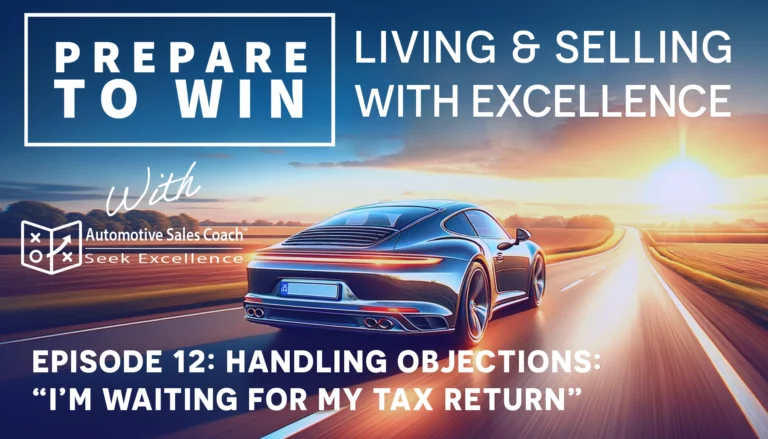Discover the secrets to transformational change without the despair of hitting rock bottom! Lets unfold the three cardinal rules of change to guide you on a path of self-improvement that begins today. We delve into the crucial steps of recognizing the need for change, visualizing the outcome, and pinpointing your catalyst for action. By tapping into the wisdom of AA and historical figures, we lay out a roadmap for navigating life’s pivotal shifts. Join us as we empower you to set achievable goals and embrace a daily commitment to growth, setting the stage for success in any area of your life.
Learn more, download action guides for each episode, and connect with us at https://preparetowin.com
David Lowe: 0:00
All right, welcome to Prepare To Win. Today, we’re going to talk about the three rules of change and we’re going to show you how to use those to maximize your results. Stay tuned.
Grace Lupoi: 0:20
I’m Grace Lepoy and I’m here with David Lowe, the Automotive Sales Coach, and we’re talking about these three rules of change. We talked about how, around New Year’s and the last episode talking really about what’s that look like and we talked about those three rules of change. Let’s talk about that.
David Lowe: 0:33
So, yeah, so we’re coming in the new year and I don’t care if you’re listening to us five years after a record there’s always a new cycle of life coming right. But we happen to be doing these original recordings as we’re turning the year. And, of course, the episode on setting goals. We talked about that and followed that up with time manage, which is crucial to setting goals, and we thought, since we’re on that subject, we should cover the three rules that govern change, so that you can make sure that your change is the changes you want, stick it and go forward. And this is really part of the soft skill sets we’re talking about. That’s right. So you’ve got the hard skill sets, like how do you use your computer right, how do you use the programs, how do you use the CRM, how do you use your appraisal thing, like how to do these things. And then you’ve got your soft skills, which we always equate to really being people skills, customer service skills, computer skills. But I would also say, doesn’t personal improvement fall under that?
Grace Lupoi: 1:36
I think so.
David Lowe: 1:37
Because it’s not right. So I think, and a lot of times we don’t naturally have some of the skill sets that we want, and so we’ve really dedicated this podcast to help people become better today than yesterday.
Grace Lupoi: 1:52
Right.
David Lowe: 1:52
And to be better today than yesterday, we need some new thinking, some new ideas. Right, we need a new plan, and we’re dedicated to reminding you what you know is true and, of course, giving you tips to, maybe, things you haven’t thought about before. All right, so let’s talk about the three rules of change.
Grace Lupoi: 2:09
Right.
David Lowe: 2:10
What are the three rules of change? Obviously you have to what first, see the need. See the need, why change if I don’t need to? Now, by the way, you don’t have to hit rock bottom to see the need. We’ll talk about that in a minute. So the first time I’ve seen the need, then we have to see the actual changes. What’s it look like? What’s change? Look like? What if I do? What if I don’t? So why should I change? See the need, and then what should I change? Do? And really, when we say see the changes, we might also say what happens if I don’t change? What happens if I do? What’s the reward or penalty?
Grace Lupoi: 2:44
I improve what happens, that’s right.
David Lowe: 2:46
So that could be part of that. And, of course, the third one is to change agent. We need something to come into our life as a catalyst to help us with that, and so these are really powerful things I’d like to use if I could. I’m not sure how many are familiar with the AA and the 12 steps. Alcoholics Anonymous, and boy. They’ve used these three steps to help millions of people conquer something they were fighting with alcoholism. And people are like I got my 30-year chip. I mean, people have changed their lives. They’re literally the three rules that change. Aa has incorporated them into their programs, so I’d just like to go over those, how those work, and maybe you can see how to translate that into your life. So, first one we said first rule of change, see the need. See the need? Ok, at Alcoholics Anonymous, you have to show up to a meeting and say what Hi, I’m Dave and now I’m an alcohol. Yeah, right, why am I here? In other words, until you really, so you might show up to the meeting because people tell you to go. Nothing’s going to happen. Until, at one of those meetings, you raise your hand and you yourself says what See the need? Now I got to tell you. Aa typically says that people have to hit rock bottom before changing. I think the saying is I got sick and tired of being sick and tired.
Grace Lupoi: 4:12
OK, something like that.
David Lowe: 4:13
OK, it’s good, right, and I hope, if you’re struggling with anything, I hope you’re sick of it let’s move on. Right, we can take control of our thoughts. We can change our thoughts and as we change our thoughts, we can change how we feel about things. We can change how we act and we can actually reprogram our brain. In fact, we’ll be doing some more training on that neuroplasticity down the road, the ability mind over matter, right. But right now we’re talking about these rules of change. We’re talking about AA, we’re talking about seeing the need and we’re talking about, you know, hitting rock bottom. What does that look like? And I wanna tell you right now that you may see the need to change and you haven’t hit rock bottom, and good for you. The best way is to see I’m really good and I see the need to be better. That’s what this whole podcast is about. Everything we do in every episode. We don’t want you to hit rock bottom before you decide to change. You don’t want the doctor to threaten you before you go to the gym or change your diet. You should be in a good position and wanna get yourself a new, better person, be more effective, so you can be more of a benefit to other people. So we have to see the need to change. But the word need could be changed to see the reason to change. So need could say I hit rock bottom. Reason could say I’m really good and if I wanna be better then I need to change. Does that make sense? Okay, so it starts with that self realization. All right, now that we have that, what do those changes look like? So AA has a great way to do this. They have their meetings. You go to church basement, have some coffee and you have a meeting and they have their 12 step plan. Now, one of the cool things we said some of those laws of influence, social proof, big one. And the AA incorporates that. You go to a meeting and somebody stands up and says here’s what my life used to be and here’s what my life is. That’s literally seeing the changes. They also give you a proven sounds familiar, right, a proven game plan. That’s what our sales coach. We’re giving you. A proven game plan. Aa has a 12 step pro. It’s proven. They say if you work it, it works. Same thing we say about our most sales coach in the playbook it’s a proven process. If you work it, it works. I mean, no map has ever carried anybody one mile on their journey. Having a great map is only part of it. You have to work it. So you see the need which should draw our motivation. I want it to be better. What do those changes look like? And often we want to go out and get some better information. What do those changes look like? And it might say what happens if I do, what happens if I don’t, and the 12 step program is how I’m gonna get there. So I would highly recommend. So, number two see the changes we were talking about Solomon Aran of course you’re sick of me talking about, but his principles. So we’ve got Solomon and everything that came after Confucius, asa, we have Aristotle, we have all these philosophers that Solomon wrote the book on wisdom and kind of started that whole thing going. Really, in my opinion, these are timeless truths that we need to understand, and Solomon said well, there’s no vision, the people perish. So if you don’t know where you’re going, then you’re gonna get lost. So I’d like to reverse it, though, and say if you have a plan, you can get to where you’re going. So, instead of if there’s no vision, when you have vision, instead of perishing, when you have vision, you can thrive. Okay, so let’s use Solomon’s vision process. So see the need we’re on, see the changes. Here’s how you see the changes. Okay, so let’s say I’m gonna give you something frivolous like losing weight. Okay, I want to lose weight, and why? I mean, what am I doing this for? Like, actually, I’m doing that this year I’d wanna cut a few pounds and I’m in really good shape. I haven’t hit the rock bottom. I just feel like I could do a little better job, and so I’ve got to start with that. Why do I wanna do it? What happens if I don’t? What happens if I do? Not a much consequences if I don’t, but it’s something that I desire. So I have to start with. Where am I now? I gotta have a clear, honest picture. Where am I now? If I walk by the mirror and suck in my stomach every time and lie to myself, then I say, dave, you’re as ripped as you were when you were 36. Why so? You gotta acknowledge, right, I’m 58 years old. I’m not in the shape that I once was, and that’s okay. I’m getting older, but I know I can be in better shape. But I need to have an accurate measurement. Where am I now? And then I need to set a clear destination, kind of like a Google map. Where are you now, where do you wanna go? And so I have to set a clear destination. I wanna go from 13% body fat to 10% body fat Again a frivolous thing, but I’ve used it to give you guys kind of a way to do this. So here’s where I am, here’s where I wanna go. Now the question is how am I gonna get there? And that’s I know how to get there. You know, I’ve competed and we’ve talked about that before, and I know how to get ripped, and I’ve known that for the last few years, but I have not been willing to do it. So I have to make a decision. I know what to do and how to do it. Right now the question is do I want it enough? Because you know what? Nothing good ever just happens. If I wanna make this happen, it’s gonna take sacrifice, and I know the sacrifice because I’ve been through it competing and I know what it’s like. So it’s not just knowing where I am or knowing where I wanna go, it’s knowing how to get there, and then the why has to be strong enough to get me to do what.
Grace Lupoi: 10:19
I need to do the decision’s. Not enough right? It’s like I gotta see what I’m gonna do and then what I act on it Right.
David Lowe: 10:26
So the decision, like I said, the decision is daily. Same with AA. Decision is daily. So am I willing to do what it takes to have what I want to get? Everybody’s gotta ask themselves, whenever you’re sitting there and say rules for change, or I’d say rules for improvement do I see the need? I mean, why do it and what is my plan right? So see the changes. What is my plan? Where am I now? Where do I wanna go? How am I gonna get there? Again, it’s my why, strong enough to commit myself to the diligence to do the things that it takes to get where I wanna go. So a lot of people start AA and fail and they’ll tell you just come back. They’re never mad at you when you’re fall. That’s human. So I’m gonna tell you something. You’ve probably had a plan to do stuff. You probably saw the need to change. You’ve worked on it. You’ve probably fall and failed. Who cares? We can’t go back and live yesterday, get up and start again. In fact, I’ve seen people no people that would have a year-long chip or more, meaning they’ve been successful for a year and they fall and now they’re back with their one-week chip and it feels like you’re going backwards, but you’re not. You’re still pursuing the ultimate goal. It’s not the number of the days, it’s today. You are living the way you’re supposed to live. We’ll worry about tomorrow. Tomorrow, so that’s the daily decisions. So, listen, if you’re setting some goals as we talked about a couple episodes ago and you’re setting apart some time to accomplish those goals, we talked about in the last few episodes that time management, saying yes to things says no to other things. And now you’re framing them. What do I really want? Right, the rules for change. Do I see the need and what those changes look like? I think that it’s pretty simple to sit down and write this vision statement out that says I am here, I want to be here and here’s why I want to go there. List that out and then write your game plan. And during the goals episode we talked about, everything you want to know is available to you. It’s amazing to me. Something fell off my German glasses. I couldn’t figure out how to put it back on. I just YouTubeed it and there it was. Other people have problems with the same thing and, sure enough, I watched it. I learned how to do it. So I mean, of course, everything you can get the knowledge that you need. If you want to Now, I like to use a proven game plan. So typically, if I want to quit drinking, I’m going to go to AA. They got a proven plan right. If I want to get in shape, I’m probably going to talk to somebody or follow somebody who’s in the shape that I want. If I want to be a better mountain biker, I’ll probably study some of the professional mountain bikers and learn from them, right. It’s kind of a great way to go. So the knowledge is out there, right. Ok, a third thing for change. We say it’s a change agent and this is a big one. What is the catalyst? What’s going to keep you going? Right Now, aa is brilliant. With this you get a sponsor. This is brilliant. A sponsor is accountability Somebody you have at your disposal to call when you’re struggling. And that’s what a sponsor does, more than a friend, an accountability partner, an accountability friend and I think that’s a great change agent is happening. I think their meetings are also change agents. You know, you don’t go and say I need to change. I’ve been at the meeting and I’m going to use the 12 steps, but you got working. The 12 steps means keeping coming to the leads. You got to keep doing it. So the catalyst to change for AA is also part of the how to right to see the changes is that 12 step program. So I think that you need in your life. So let me give you an example. I’ve been talking about this and I know I need to do cardio at night If I want to accomplish my goals. I’ve succeeded really well. I’ve done a lot of bike riding. The last thing at night, 8 o’clock to 8 30, shower go through my game plan for the next day, chill out with my wife and dog for the last hour and go to bed at 10. 20. I, like that routine really got out of it. So I had a life cycle bike and it was a nice bike and that I’d ride it at night, but I just got bored of it. So, I upgraded to a Nordertrack with iFit and I’m excited about this bike. This is a catalyst in my life and so, like last night, I was tired, thanks, you know. Or Christmas, we had the Christmas dinner, my family was over, we sat around lazy time. At quarter eight last night I said I’m going to ride. Just the presence of that bike has been a catalyst for me. In other words, it gets me excited to get up and go. Now, incidentally, the bike tracks my rides and the bike tells me stuff, so you know your watch will track your calories or your steps. There’s so many ways to have a change agent in your life. I’m telling you this, though start with a partner, a human. So my wife and I are riding every day. We don’t ride at the same time, but we’re each riding, so we have this kind of thing going on. That’s a great change agent.
Grace Lupoi: 16:11
As an iron sharpens iron.
David Lowe: 16:12
That’s it, and we’ve got to have that. So today we’re talking about the three rules for change See the see the needs see the changes and the change agent. We’re talking about Solomon’s vision process. Where am I? Where am I going? Why am I going and how am I going to get there? We talked about AA’s proven process. So the question really is, what do you want to change? And I think when we go back an episode or two and look at the goal setting episode, if you haven’t listened to it, go back. We asked you to talk about your values. What do you value? And maybe just write a list what areas, what are your values? So, and I think maybe I would start with things that are most jugular, meaning we’ll have the biggest impact on you Like, maybe you start with those. Some might do that. So maybe that’s too big, so start with something that’s smaller so you can gain confidence as you accomplish things. But go through your list and decide, hey, I want to change in this area and I’m going to use this formulation to do it.
Grace Lupoi: 17:11
And I think, right off of that, we talk about the difference in okay, I think these things and I have to really make sure I have a clear vision of what I want. I know for you and me it’s writing things down. We mentioned that already. Write your goals down, where’s my need, what is the thing that I want to change, how can I do that, what are the changes, and then what happens when I do so.
David Lowe: 17:30
What’s my?
Grace Lupoi: 17:31
change agent going to be and having those things written down where I can look back every day and say, okay, here’s my goal, when am I at on that goal. It helps you not even just see your goal and have it organized, but really have that clear vision. And when I see things written down it’s so much clearer to me.
David Lowe: 17:46
Boy. That’s it. What a great change agent. Anybody can have that. So if you don’t have anybody in your life and you don’t have an I-Fit Nordtrack bike, right, okay, okay, whatever, it’s my change Boy, just writing things down and reviewing them often what a great idea for a change agent. There’s a lot of ways to hold yourself accountable, you know, and if you can find a partner, even better. Make your list, decide what you want and use these rules, and I guarantee if you put them to play, you can change. We appreciate you being with us. We hope this was a benefit to you. We’re going to talk about things in our episodes that have impacted our lives and we think will impact yours, and so it’s been a benefit to it. Grace always asks you go ahead and like us, like us comment right.
Grace Lupoi: 18:32
Follow us subscribe.
David Lowe: 18:33
Yeah, whatever you need to do, and we hope to see you for the next episode. Live and sell with excellence this week.







